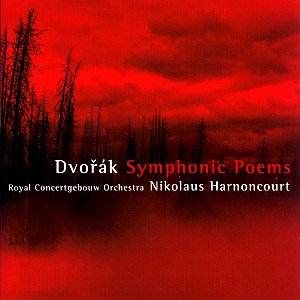Dvořák
had completed his nine symphonies when he turned to the composition
of symphonic poems after returning to his homeland from America.
This was perhaps for reasons of nationalistic nostalgia, and he
also paid close attention to operatic projects at this time. The
series of symphonic poems took versions of old Czech fairy stories
by the poet Jan Karomir Erben, bringing them colourfully to life,
using a larger orchestra than in the more classically inclined
symphonies and concertos. The composer had based his earlier oratorio
The Spectre's Bride on Erben's poetry, and the poet's death in
1895 inspired him to this new project.
Like
the stories of the Brothers Grimm, Erben's Czech folk tales are
uniformly gruesome, vividly unpleasant. They inspired Dvořák
to some of his most powerful and colourful orchestral writing,
heard at its best, perhaps, when the tautness of the construction
is at its most concise. Of these four examples, therefore, The
Noonday Witch and The Water Sprite seem more compelling than The
Wild Dove and The Golden Spinning Wheel. Or to put it another
way, the latter two pieces pose an extra challenge of interpretation,
which in these performances results in a certain slackness of
intensity.
The
recorded sound is generally impressive. Take the opening of CD1,
The Golden Spinning Wheel, which has particularly vivid orchestral
sound, admirably captured in the spacious Concertgebouw acoustic.
The rhythms drive the music on with the utmost vitality and energy,
as they do in the other pieces too. But nearly half an hour is
a long span of unbroken music, and the tensions do slacken somewhat
as the music proceeds - more than in István Kertesz's performance
with the LSO (Decca), also beautifully recorded though of an earlier
generation.
These
misgivings apply also, though perhaps less strongly, to The Wild
Dove, in which the musical challenge of time-span is paramount.
The playing is always as reliable and sophisticated as one would
expect from this source.
The
two shorter pieces, The Noonday Witch and The Water Sprite, are
more compelling, and the latter is as exciting a performance as
can be found on disc. Harnoncourt's pointing of rhythm and shaping
of phrase generates an excellent balance and cogency to the whole
piece, which emerges as a real masterwork. And nowhere does Dvořák
orchestrate to better effect or to higher priority than in these
symphonic poems, making the rich and sensitive Teldec sound a
great bonus.
The
two discs play for only a shade over the time limits of one, amounting
to just under 83 minutes in total; but this is reflected in the
price. But they come in a nicely produced slim case, including
a carefully planned leaflet containing the necessary information
of background and stories.
Terry Barfoot
